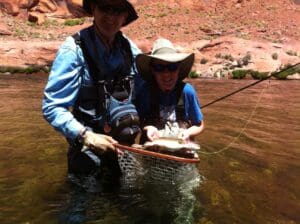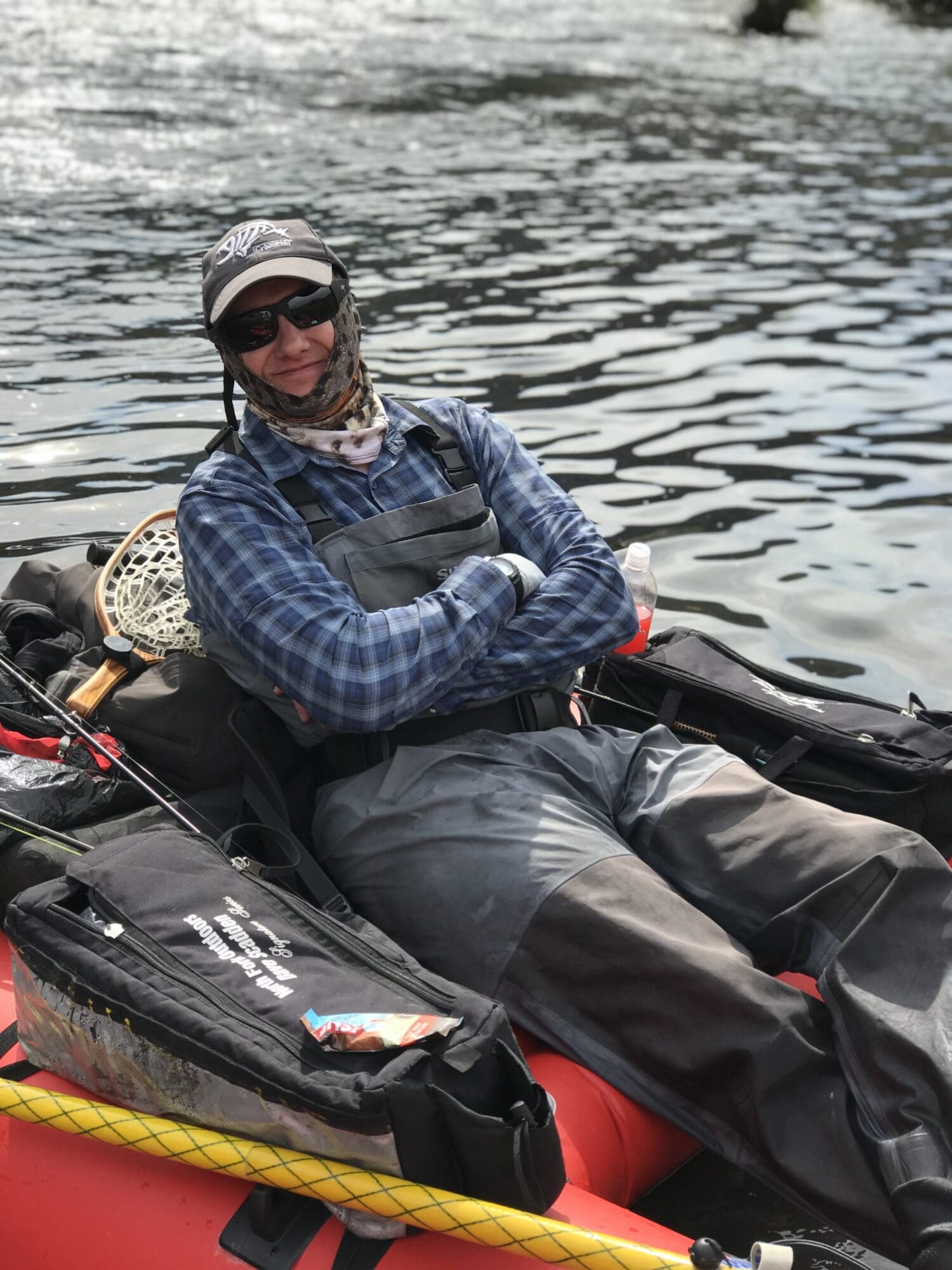
Where It All Started
For as long as I can remember, I loved fishing. As a child my dad would take me fishing (mostly Lake Mead and SoCal ocean areas), often enduring my constant rock throwing and rat’s nest line tangles. I liked fishing with bait, lures, bobbers, willow sticks, or even my hands as occasion permitted.
I never considered fly fishing seriously until my freshman year in college when I was at a mountain lake fishing with bait and lures, watching a fly fisherman absolutely slay it while I struggled to catch much. Watching the casts and the fish rise to the fly presented by this fly fisherman was beautiful. A few years later, I watched “A River Runs Through It” and my determination was cemented to pick up fly fishing when I had more time in my life.
My first real fly-fishing experience was on Mammoth Creek in Utah. I hooked a colorful 15-inch native brown trout on a nymph pattern and the feeling was like no fishing experience I’ve ever had before. Thus began my love of fly fishing. It’s been many years since that day, and I have had a lot of time to learn and develop my admittedly limited skills in fly fishing. Here’s what I’ve learned for myself so far:
Lessons Learned
- You will have many frustrating days on the water if your main focus is catching fish and how many you lose, miss, or never see along the way. You are out in nature, on a river, stream, lake, or ocean enjoying the connection to nature. Enjoy the journey and worry less about the fish count. It has helped me to have a better time while out on the water when I remember this fact. I used to get what an old friend once called “fishitus,” which means elevated blood pressure, shaking hands, and a sense of urgency to get my line in the water. Rushing things does not make you fish better, nor will it help you catch more fish. Relax and enjoy!
You will have moments when you figure it all out for a few moments. Some promising tip you read about. Some video you watched that makes it all clear in your mind. Maybe even a piece of new fly-fishing equipment that will transform you into a master fisherman. I like to call these “fly-fishing revelations.” Life is full of little disappointments, and these will be some of yours if you think one new item or tip picked up along the way will change everything in your ability to fly fish effectively. Each body of water is different. Each day is different. The fish will act differently from one minute to the next, just like humans. Some of the fun of fly fishing is trying to figure it out while you are on the water.
- You can never have too many fly patterns in your arsenal. It’s fun to pick up new flies at a local fly shop near the water where you are fishing. They always have what one fly-fishing buddy terms “getters” – flies that will obviously (in our minds) catch tons of fish. Local fly shops know the area the best and can help with fly selection. Over time that adds up to many flies in many fly boxes. I’m definitely a fly collector now whether I will admit it or not. I still go to the local fly shops and leave with a few flies and high hopes for success. The side benefit is we keep these fly-fishing shops open – support them or they will be gone one day!
- If you are new to the sport and really want to learn quickly, there are tons of online videos, classes, books, and articles that can help you along the way. Nothing will teach you better than getting out on the water and trying things yourself. If you have the funds, a guide is a great way to go to learn a body of water and fine tune your skills. I have used a few over the years and I always pepper them with questions and ask for critique on what I am doing. You never stop learning in fly fishing. Don’t be afraid to ask questions. Fly fishermen are usually happy to help.
- Not all fish are created equal, but enjoy the fight whatever the fish. Yes, I love trout best – they are absolutely stunning creatures. However, I have caught enough whitefish on rivers for my closest fly-fishing friends to nickname me “whitey.” I don’t mind catching those or any other fish. Enjoy the fight whenever you have a tight line, whatever the fish.
Fly fishing isn’t a cheap sport. Oh, it can be if you stick to the basics. But you likely won’t when you really get into the sport. New rods, reels, waders, lines, and other equipment can be expensive. Usually, you get what you pay for. However, you don’t need most of the new gadgetry and gizmos out there on the market to start. A solid fly rod and good fly line will take you far, even if the rest of your gear is adequate at best. Start there and avoid taking out a home mortgage or placing a personal items insurance policy through me for the expensive stuff. You can get that later once you are addicted! Tip: make sure your spouse knows the nice fly rod you want is for wilderness survival and emergency preparedness for the family, not just a toy – a zombie apocalypse may be right around the corner.
- All the gear in the world will not make up for bad technique and presentation. A hungry fish will often take any fly if presented naturally. One the flip side, that fly that you are sure is a “getter” will almost never work if the line is dragging the fly unnaturally in the water. I say almost never because I have seen fish take flies when they never should. It can and does happen occasionally.
- Handle the fish you catch carefully, if at all (especially trout). Take the hook out carefully too. That fish you just got in the net that fought like crazy and brought that big smile to your face is now super tired. Think how you would feel right after a strenuous workout if you were dunked underwater for a while – not good. Keeping the fish in the water – maybe only out for a quick photo – will help preserve the fish and spread the smiles to other anglers that will pass by after you.
Spend less time casting and more time fishing. As I mentioned before, I loved “A River Runs Through It,” especially the shadow casting done by Brad Pitt. However, that’s a movie and we live in the real world. Spend less time casting and more time with the fly on the water. You get less tangles, less time trying to get your flies out of trees, and less chances to scare the fish. Simple forward casts, roll casts, and water load casts are better than Brad Pitt’s excessive shadow casting – trust me. There are trees and submerged branches across the western United States with my flies on them.
- Learn your knots and don’t take shortcuts when tying your flies and line. In fly fishing you need to know the clinch/improved clinch, double surgeons, and blood knot. Other knots that come in handy for me are the uni-knot, nail knot, and perfection loop. I took shortcuts or was careless at times with my knot tying and paid the price. I still kick myself for a trophy-sized trout I was fighting that ended up headed downstream with my fly line that had separated from my backing. All because of a badly-tied knot between the fly line and backing from yours truly.
There you have it. My 20+ years of limited fly-fishing wisdom condensed in a few paragraphs. I’ve made a lot of mistakes along the way, but I relish the journey as much or more than the destination now; but if you ever see that fly line with the trophy trout still on it, please give me a call so I can finally catch that one that got away. It still haunts me.

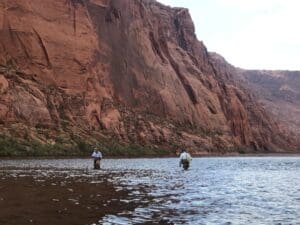
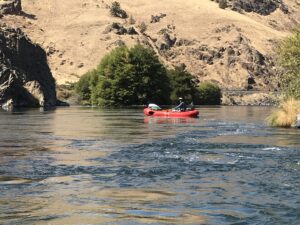 You will have moments when you figure it all out for a few moments. Some promising tip you read about. Some video you watched that makes it all clear in your mind. Maybe even a piece of new fly-fishing equipment that will transform you into a master fisherman. I like to call these “fly-fishing revelations.” Life is full of little disappointments, and these will be some of yours if you think one new item or tip picked up along the way will change everything in your ability to fly fish effectively. Each body of water is different. Each day is different. The fish will act differently from one minute to the next, just like humans. Some of the fun of fly fishing is trying to figure it out while you are on the water.
You will have moments when you figure it all out for a few moments. Some promising tip you read about. Some video you watched that makes it all clear in your mind. Maybe even a piece of new fly-fishing equipment that will transform you into a master fisherman. I like to call these “fly-fishing revelations.” Life is full of little disappointments, and these will be some of yours if you think one new item or tip picked up along the way will change everything in your ability to fly fish effectively. Each body of water is different. Each day is different. The fish will act differently from one minute to the next, just like humans. Some of the fun of fly fishing is trying to figure it out while you are on the water.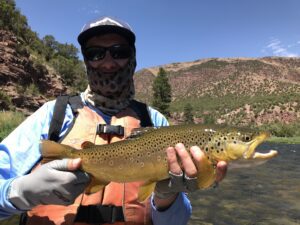
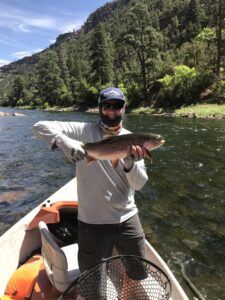 Fly fishing isn’t a cheap sport. Oh, it can be if you stick to the basics. But you likely won’t when you really get into the sport. New rods, reels, waders, lines, and other equipment can be expensive. Usually, you get what you pay for. However, you don’t need most of the new gadgetry and gizmos out there on the market to start. A solid fly rod and good fly line will take you far, even if the rest of your gear is adequate at best. Start there and avoid taking out a home mortgage or placing a personal items insurance policy through me for the expensive stuff. You can get that later once you are addicted! Tip: make sure your spouse knows the nice fly rod you want is for wilderness survival and emergency preparedness for the family, not just a toy – a zombie apocalypse may be right around the corner.
Fly fishing isn’t a cheap sport. Oh, it can be if you stick to the basics. But you likely won’t when you really get into the sport. New rods, reels, waders, lines, and other equipment can be expensive. Usually, you get what you pay for. However, you don’t need most of the new gadgetry and gizmos out there on the market to start. A solid fly rod and good fly line will take you far, even if the rest of your gear is adequate at best. Start there and avoid taking out a home mortgage or placing a personal items insurance policy through me for the expensive stuff. You can get that later once you are addicted! Tip: make sure your spouse knows the nice fly rod you want is for wilderness survival and emergency preparedness for the family, not just a toy – a zombie apocalypse may be right around the corner.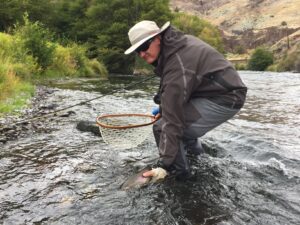 Spend less time casting and more time fishing. As I mentioned before, I loved “A River Runs Through It,” especially the shadow casting done by Brad Pitt. However, that’s a movie and we live in the real world. Spend less time casting and more time with the fly on the water. You get less tangles, less time trying to get your flies out of trees, and less chances to scare the fish. Simple forward casts, roll casts, and water load casts are better than Brad Pitt’s excessive shadow casting – trust me. There are trees and submerged branches across the western United States with my flies on them.
Spend less time casting and more time fishing. As I mentioned before, I loved “A River Runs Through It,” especially the shadow casting done by Brad Pitt. However, that’s a movie and we live in the real world. Spend less time casting and more time with the fly on the water. You get less tangles, less time trying to get your flies out of trees, and less chances to scare the fish. Simple forward casts, roll casts, and water load casts are better than Brad Pitt’s excessive shadow casting – trust me. There are trees and submerged branches across the western United States with my flies on them.